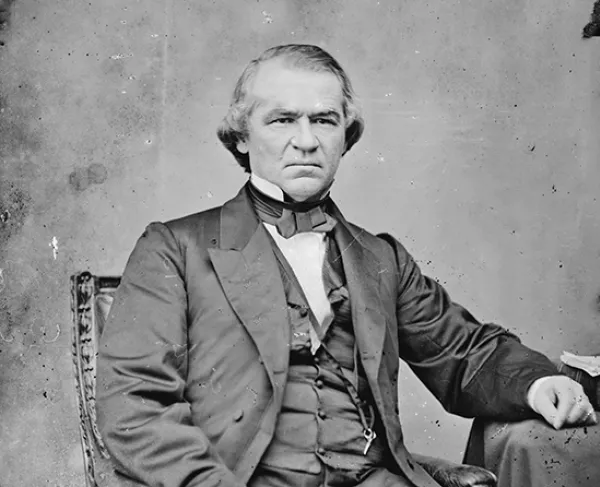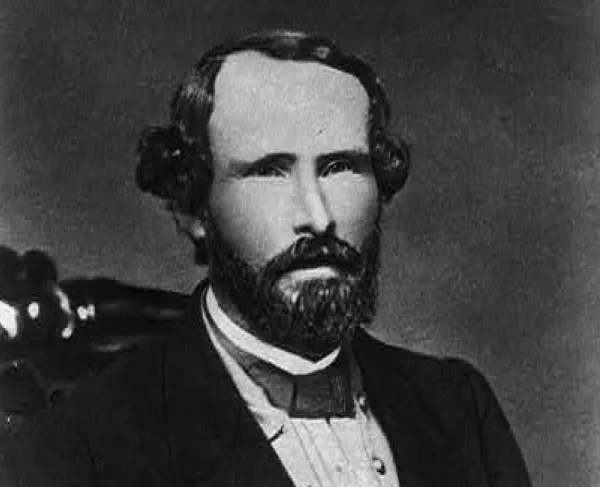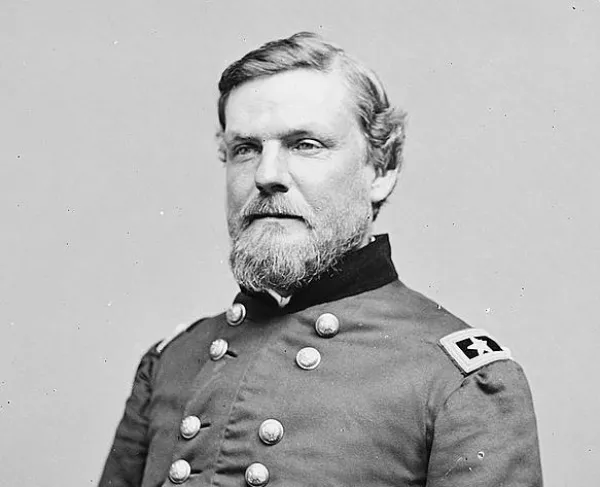Andrew Johnson

Often dubbed the “courageous commoner,” Andrew Johnson was born in a log cabin in Raleigh, North Carolina to nearly illiterate parents. He was not proficient in the basics of reading, writing, and math until he met his wife at age seventeen. He studied diligently under his wife, Eliza McCardle, and paid people to read to him while he worked. The only other man to become president with so little formal education was Abraham Lincoln. However, while Lincoln is often upheld as an exemplary president, Johnson is considered to be the opposite.
At fourteen, Johnson and his older brother, William, were apprenticed to a local tailor. In 1826, he started a tailor shop in Greeneville, Tennessee, where he met his wife. By 1834, Johnson, a Jacksonian Democrat, had served as town alderman and mayor. Local workers and other common people were drawn to Johnson’s down-to-Earth, forthright demeanor. The tailor quickly rose up in the ranks of politics to the state legislature, U.S. House of Representatives, and the governorship of Tennessee.
By the time the Civil War broke out in 1861, Johnson was a first-term U.S. Senator that identified with the proslavery and states’ rights mentality that was popular in the Democratic party. However, Johnson was a War Democrat and disagreed with a majority of his party over secession. After Tennessee left the Union, Johnson was the only Southern senator to remain in the U.S. Senate. The South saw him as a traitor and the North welcomed him as a hero. Johnson wanted to preserve the Union, but did not believe in emancipating slaves at the start of the war. He even asked Lincoln to exclude Tennessee from the Emancipation Proclamation while Johnson was the military governor of the state. He eventually agreed with emancipation, but only as a war measure to use against the South. Lincoln, fearing his chances at reelection, saw the value in having a War Democrat like Johnson on a presidential ticket with a Republican. Lincoln and Johnson achieved victory in the 1864 election.
The new Vice President was sworn in on March 4, 1865, and delivered a somewhat incoherent inaugural address after drinking some whiskey to help him feel better as he recovered from typhoid fever. The slurred speech provoked many rumors that claimed he was a drunk, even though he was not. Johnson got off to a bad start. When President Lincoln was assassinated on the night of April 14, 1865, Johnson was supposed to suffer the same fate, but Johnson’s would-be assassin, George Azterodt, backed out of the plot at the last minute.
As the new President, Johnson wanted to quickly bring the seceded Southern states back into the Union. He pardoned former Confederates that took an oath of allegiance, but required Confederate leaders and other people of high status to earn a Presidential pardon. Johnson also allowed former Confederate states to elect new governments. These governments quickly created black codes to oppress and control the newly freed people. When Congress reconvened in December 1865, it refused to let the new Southern members in. Many, especially the Radical Republicans, felt that Johnson was being too lenient in his Reconstruction policies.
In 1866, Johnson vetoed the Freedmen’s Bureau Bill and the Civil Rights Bill and even encouraged Southern states not to ratify the 14th Amendment. He started a speaking tour during the congressional elections of 1866 to gain support of his Reconstruction policies, but it was a failure and Republicans won the majority in both the House and Senate. As tensions continued to rise, the House of Representatives finally voted for the impeachment of Johnson in 1868. The President was accused on eleven charges, including the violation of the Tenure of Office Act when Johnson dismissed Secretary of War Edwin Stanton, who disagreed with Johnson’s Reconstruction policies. However, Johnson was acquitted by one vote in May of 1868.
Johnson did not run for reelection after the Democratic Party chose Horatio Seymour as the presidential nominee for 1868. After returning to Tennessee in 1869, he lost the election to the U.S. Senate and in 1872, lost the race for the U.S. House of Representatives. In 1875, he finally won a seat in the Senate, but died from a stroke that year on July 31st in Carter County, Tn. He is buried in Greeneville, Tn. with his copy of the Constitution and his body wrapped in the American flag.





